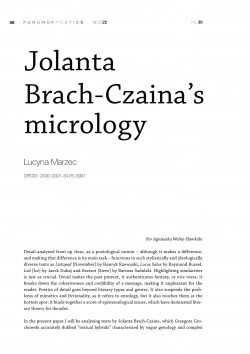
Lucyna Marzec
A b s t r a k t
The paper discusses the writing and philosophy of Jolanta Brach-Czaina, connecting it to micrology and maieutics. This poetological reflection considering the function of detail and work of similarities and differences in Brach-Czaina’s most significant works (Sofa, Szczeliny istnienia, Błony umysłu) identifies two tendencies of her philosophy: searching for a textual “representation of meaning” and a sensual description of “particles of being”. The paper discusses Brach-Czaina’s ambivalent approach to metonymy and synecdoche, and characterizes her style, which combines a focus on inconspicuous detail and non-conclusiveness of paradoxes. Absorption of concrete and abstraction, creating an impression of precision, and at the same time vagueness are key features of Brach-Czaina’s poetics. Her philosophy has much in common with Italo Calvin and Anne Carson, whose parallel way to seeking the essence of cognition and poetic language has led to the Socratic theory of Eros.





